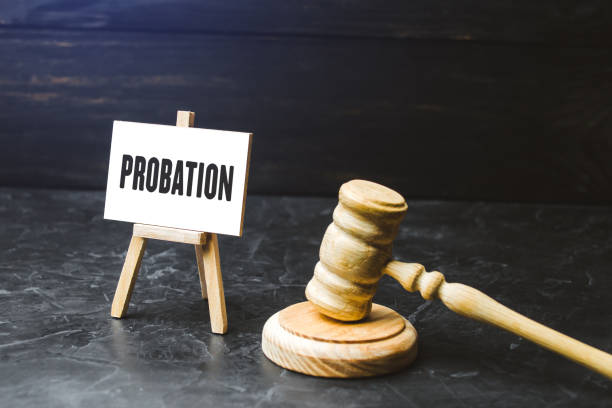The term ‘probation’ often carries with it a cloud of uncertainty and questions that extend far beyond its basic definition. “What Do Probation Mean?” is not merely a grammatical query—it’s a question loaded with legal implications, societal impacts, and individual consequences. This article is meticulously crafted to dissect the multifaceted concept of probation and illuminate its role within the criminal justice system.
Our expertise in legal matters and the nuances of criminal rehabilitation allows us to provide a thorough analysis of probation, offering clarity to those entangled in its complexities, whether directly or indirectly. We intend to untangle the intricate web of guidelines, expectations, and implications that probation entails for individuals undergoing this legal supervision.
We delve into the origins of probation, its intended purposes, and how it functions as an alternative to incarceration, focusing on its execution within various legal frameworks. Additionally, we examine the conditions and responsibilities placed upon those under probation, and the potential paths it lays out for their future.
As we navigate through the layers of this topic, our content will not only address the legal definitions but also the real-life applications and challenges of probation. Our goal is to foster a comprehensive understanding and provoke thoughtful discussion on the effectiveness and ethical considerations surrounding this corrective measure.
Join us as we explore the complexities of probation, ensuring that by the end of this article, you’ll have a grasp on the subtleties of what probation means, how it is applied, and the way it affects the fabric of society. Let’s begin this enlightening journey through the world of legal rehabilitation and discover the true meaning of probation.
Contents
Definition Of Probation
Overview of probation
Probation allows individuals convicted of a crime to avoid imprisonment by completing their sentence under community supervision. It is issued in lieu of jail or prison time.
What is probation?
- A sentencing option whereindividuals found guilty complete their sentence in the community.
- Convicted persons serve a probation term under supervision of a probation officer.
- Probationers must adhere to court-ordered conditions and restrictions.
- Violating probation risks revocation and incarceration.
The importance of understanding probation
For individuals sentenced to probation and their support systems, having comprehensive knowledge of the process, conditions, and rehabilitation services is critical to successfully completing supervision. Key benefits include:
- Avoiding unintentional violations and reoffending.
- Navigating complex probation requirements and court procedures.
- Accessing resources needed for rehabilitation and reentry.
- Advocating for probationers’ rights and opportunities.
- Mitigating probation’s impact on families.
More watching video: Probation, Parole – What’s The Difference?
Probation Eligibility and Restrictions
Determining probation eligibility depends on the nature of the crime, criminal history, and other case factors. Nevada law outlines strict criteria on probation restrictions.
Detailed criteria for probation eligibility in Nevada
- Probation is only issued for offenses with a maximum prison term of 10 years or less.
- The court must determine probation will adequately protect the public and rehabilitate the defendant.
- Exceptions exist for certain serious crimes if mitigating factors justify probation.
- Eligibility also depends on prior criminal history and probation/parole violations.
Specific crimes ineligible for probation
There are particular serious offenses where probation is prohibited by default under Nevada Revised Statutes 176A.100. Examples include:
- Murder
- Sexual assault
- Battery with a deadly weapon resulting in substantial bodily harm
The impact of prior convictions on eligibility
Prior felonies and probation/parole violations will severely limit probation eligibility, with few exceptions.
- Individuals with two or more felonies cannot receive probation.
- Those with a prior violent felony are disqualified from probation for any subsequent felonies.
However, even individuals with disqualifying prior convictions may still obtain probation through:
- Court determination of unusual circumstances.
- Completion of a specialty court program.
- Cooperation in the prosecution of other offenders.
Conditions and Supervision of Probation
Probationers must comply with court-ordered probation conditions and supervision by probation officers.
Explanation of common and specific probation conditions
There are standard conditions mandated for all probationers, along with additional terms tailored to individual cases.
Common conditions –
- Maintain lawful behavior.
- Report to probation officer as directed.
- Notify of any address/employment changes.
- Obtain permission for out-of-state travel.
- Refrain from firearm possession.
Specific conditions –
- Substance abuse treatment.
- Mental health counseling.
- Community service.
- Curfews or geographic restrictions.
- No-contact orders.
- Restitution payments.
The role of probation officers
Probation officers monitor compliance, connect probationers to services, and report violations.
- Meet regularly with probationers.
- Conduct home visits.
- Administer drug/alcohol tests.
- Verify employment or school attendance.
- Document and report violations to the court.
Use of technology in probation supervision
- Electronic monitoring devices track probationers’ locations and alcohol use.
- GPS ankle monitors transmit real-time location data.
- Smartphone applications remind of appointments and verify check-ins.
- Video conferencing enables virtual meetings and home visits.
|
Type |
Description |
|
Electronic monitoring |
Detects alcohol use and location tracking |
|
GPS ankle monitors |
Tracks real-time location |
|
Smartphone applications |
Reminders, check-ins, information |
|
Video conferencing |
Virtual meetings and home visits |
Financial Implications of Probation

While probation avoids incarceration costs, there are still significant financial costs incurred by probationers.
Breakdown of costs associated with probation
- Supervision fees – Monthly payments for probation oversight.
- Monitoring costs – Fees for ankle monitors or alcohol testing.
- Program fees – Payment for required counseling, education courses, etc.
- Fines and restitution – Monetary penalties ordered by the court.
- Drug testing – Out-of-pocket payments for random drug screens.
- Legal fees – Continued costs for legal counsel and representation.
Discussion on the economic impact on probationers
These costs place a heavy economic burden on probationers and their families, limiting resources available for rehabilitation. Potential assistance includes:
- Fee waivers for indigent probationers.
- Time payments plans spreading out financial obligations.
- Charitable funds that cover program fees, fines, etc.
- Transitional employment resources.
- Free community-based treatment options.
Duration and Adjustments of Probation
Probation terms vary based on the offense but allow for early discharge or extensions under specific circumstances.
Legal guidelines on probation durations
- Felony probation is 1 to 5 years. Certain sex offenses allow up to lifetime probation.
- Gross misdemeanor probation ranges from 1 to 3 years.
- Misdemeanor probation cannot exceed 1 year.
Circumstances under which probation periods can be modified
The court can discharge probation early or extend the term under the following scenarios:
Early discharge
- All probation conditions completed.
- Outstanding fines and fees paid.
- No violations in last 6 months.
Extension
- Failed drug tests or new criminal charges.
- Outstanding community service hours.
- Unpaid victim restitution.
- Unable to complete required counseling/programs.
Probation vs. Other Sentencing Options
Probation differs significantly from deferred sentences and parole in process, restrictions, and authority.
Comparison between probation and deferred sentences
|
Probation |
Deferred Sentence |
|
Conviction appears on record |
No conviction if completed |
|
Sentencing occurs after guilty plea/verdict |
Sentencing delayed pending completion |
|
Supervised by probation officer |
No supervision |
|
Violations mean possible jail time |
Violations trigger original sentencing |
Analysis of probation versus parole
|
Probation |
Parole |
|
Issued as alternative to prison |
Early release from prison |
|
Only conditions set by court |
Parole board sets additional conditions |
|
Probation officers monitor |
Parole officers have arrest authority |
|
Violations mean possible revocation |
Violations often lead to re-imprisonment |
Conditions, Terms, and Rights Under Probation
By law, probationers retain certain rights while losing others. Understanding the details helps ensure fair treatment.
In-depth look at standard and discretionary probation conditions
As previously outlined, standard probation conditions include:
- Maintaining lawful conduct.
- Contacting probation officer.
- Obtaining travel permission.
- No guns.
Meanwhile, discretionary conditions cover areas like:
- Substance abuse treatment.
- Curfews.
- No-contact orders.
- Geographic restrictions.
- Community service.
Legal rights retained and lost by probationers
|
Retained Rights |
Lost/Restricted Rights |
|
Voting |
Gun ownership |
|
Free speech |
Travel restrictions |
|
Due process in hearings |
Warrantless searches |
|
Access to courts |
Association restrictions |
|
Confidentiality in treatment |
Privacy |
How probationers can advocate for their rights and compliance
- Research state laws on probation rights and limitations.
- Consult legal counsel if rights are being violated.
- Request clear explanations from probation officer.
- Provide documentation validating compliance.
- Petition the court for condition changes or early discharge.
Probation Supervision Models

Jurisdictions use different probation models based on available resources and probationer risk levels.
Differentiation between formal and informal probation
Formal
- Regular mandatory meetings.
- Strict monitoring of conditions.
- Higher level of supervision.
Informal
- Less frequent scheduled interaction.
- More flexibility for probationers.
- Reduced supervision intensity.
Challenges faced in probation supervision
- High caseloads strain resources.
- Funding gaps for support services.
- Reliance on technical violations.
- Disparities along socioeconomic lines.
- Insufficient community partnerships.
Strategies for improving probation and parole supervision
- Implementing risk assessment tools to tailor supervision levels.
- Expanding access to mental health and addiction treatment.
- Incentivizing positive behavior instead of only sanctions.
- Fostering strong collaboration with community organizations.
- Using technology to enable virtual check-ins and meetings.
Probation Violations and Consequences
Violating probation conditions risks a range of serious consequences, including incarceration.
Types of probation violations
- Technical violations – Non-compliance with probation terms like missing meetings, failed drug tests, etc.
- New criminal charges – Arrest for a new offense while on probation.
The probation revocation process
- The probation officer submits a report of the violation to the court.
- The court issues a bench warrant for the probationer’s arrest.
- At the preliminary revocation hearing, the judge decides whether to revoke probation.
- If probation is revoked, the probationer is sentenced up to the maximum term.
Potential outcomes for probation violations
- Verbal or written warning from the probation officer.
- Counseling or increased treatment requirements.
- Community service or intermittent jail time.
- Modification of probation conditions.
- Full probation revocation with incarceration.
Completion and Aftermath of Probation
Once all probation terms are met, individuals transition back to normal civic life but a record of conviction remains.
Criteria for the successful completion of probation
- Completion of court-ordered probation length without violations.
- Documentation of compliance with all probation conditions.
- Payment of all fines, fees, and restitution.
- No pending criminal charges.
Transition support, life after probation
- Record sealing/expungement for eligible ex-offenders.
- Continued community-based treatment options.
- Education and vocational programs.
- Transitional housing assistance.
- Pro-social peer support groups.
The impact on future opportunities
- Convictions remain on record and impact things like employment and housing.
- Certain professional licenses are revoked or difficult to obtain.
- Ex-felons face barriers voting, owning a firearm, traveling abroad.
- Immigration status complications for non-citizens.
Statistical Overview and Effectiveness
With lower costs than incarceration, probation serves many offenders but could be improved with expanded support.
Current statistics on probation in Nevada
- Approximately 9,000 adults are on probation in Nevada.
- Nevada’s probation rate is 1 in every 50 adults.
- Almost 2/3 of probationers successfully complete supervision.
- Technical violations account for over 20% of probation revocations.
Comparison with incarceration rates
|
Incarceration |
Probation |
|
14,000 adults imprisoned |
9,000 adults on probation |
|
$30,000 annual cost |
$1,800 annual cost |
|
39% recidivism rate |
35% recidivism rate |
Effectiveness of probation in rehabilitation and reducing recidivism
Research shows probation lowers recidivism versus incarceration but better outcomes require:
- Individualized supervision based on risk assessment.
- Access to mental health and addiction treatment.
- incentives and rewards for progress.
- Strong collaboration with community services.
Comparative Analysis with Other States
While Nevada’s probation rate is moderate, other states like Georgia and Idaho have significantly lower probation populations.
How Nevada’s probation system compares to other states
Nevada
- Probation rate: 1 in 50 adults
- Prison rate: 1 in 127 adults
- Felony probation length: 1 to 5 years
Idaho
- Probation rate: 1 in 81 adults
- Prison rate: 1 in 200 adults
- Felony probation length: 5 years maximum
Georgia
- Probation rate: 1 in 68 adults
- Prison rate: 1 in 77 adults
- Felony probation length: Determined by risk level
Lessons from other jurisdictions
- Using risk assessment tools to determine supervision levels and duration.
- Linking probation length to risk levels versus offense.
- Restricting technical violation punishments for low-risk probationers.
- Developing earned discharge credits to reduce probation terms.
Community and Family Impact
communities and families play integral roles in the rehabilitation process but also face significant challenges.
The role of community resources
Local organizations provide critical programming and support like:
- Employment training and placement assistance.
- Transitional housing and transportation vouchers.
- Outpatient substance abuse and mental health treatment.
- Mentorship programs pairing probationers with prosocial influences.
- Low-cost legal resources.
The effect on families
Probation burdens families emotionally and financially:
- Added household expenses for fines, fees, treatment costs.
- Employment struggles making financial stability difficult.
- Disruption to family life from geographic restrictions or association limits.
- Stigma families face supporting someone with a criminal record.
- Stress of possible re-incarceration.
Mental Health and Substance Abuse Support
Untreated mental illness and addiction are major drivers of re-offense. Access to adequate treatment resources is critical.
Overview of support programs
- Court-ordered therapy, counseling, and treatment groups.
- Inpatient and outpatient rehab programs.
- Cognitive behavioral therapy approaches.
- Medication assisted treatment for addiction and dual diagnosis.
- Peer support groups and 12-step programs.
Success stories and challenges
Treatment programs show success when:
- Individualized for probationer needs.
- Offered free or low-cost in the community.
- Combined with housing, employment, and prosocial services.
- Rewards progress instead of punishment.
Challenges arise from:
- Limited funding and availability of services.
- Punitive responses to relapse.
- Lack of anonymity and confidentiality.
- Insufficient length of court-ordered programming.
Challenges, Criticisms, and Reform
While probation provides an alternative to incarceration, there are valid criticisms of the system’s current implementation and effects.
A critical look at the probation system
Over-supervision
- Excessively strict conditions for low-risk individuals.
- Disparate impacts along socioeconomic and racial lines.
Financial burden
- Growing, excessive fees and fines on probationers.
- Inability to pay becomes a common violation.
Discussions on reform efforts and policy improvements
Reform efforts
- Reduced supervision intensity based on risk levels.
- Curbing excessive technical violations.
- Eliminating fees or reducing based on ability to pay.
Policy improvements
- Decriminalizing technical violations.
- Earned early discharge for compliance.
- Free community-based treatment options.
- Improved data collection and transparency.
Technology’s Role in Modern Probation
New technologies enable more effective probation supervision but also raise ethical concerns about privacy and fairness.
Exploration of modern technologies used
- Electronic monitoring tracks locations and alcohol use.
- Smartphone applications verify check-ins and appointments.
- Predictive analytics assess risks and needs.
- Biometric voice recognition confirms identity remotely.
- AI analyzes data patterns predictive of violations.
The potential future
Upcoming technological advances could allow:
- Virtual reality for simulated high-risk scenarios.
- Passive alcohol monitoring with ankle skin sensors.
- Real-time emotion detection for psychological states.
- Sophisticated cognitive behavioral therapy chatbots.
Ethical implications
- Infringement of reasonable privacy expectations.
- Potential for overreach, abuse, and lack of transparency.
- Exacerbation of existing societal and racial biases.
- Lack of informed consent over data usage.
- Insufficient security protections for sensitive data.
Success Stories and Rehabilitation
While challenges exist, many probationers go on to transform their lives through the process. Their stories inspire hope.
Narratives of individuals who have successfully completed probation
James, 28
- Convicted of felony drug possession at 19.
- Got sober in rehab and committed to change.
- Graduated college while on probation.
- Now leads workshops helping youth avoid his mistakes.
Lisa, 36
- Faced 10 years’ probation for fraud charges.
- Embraced counseling and repaired family relationships.
- Rose to manager at marketing firm.
- Now mentors other women on probation.
Lessons and advice for current probationers
- Take full advantage of opportunities like job training programs.
- Surround yourself with positive people not enabling old behaviors.
- Don’t let shame or discouragement prevent you seeking support.
- Reflect on who you want to become and take steps each day.
- Believe you have potential beyond your mistakes.
Conclusion
Probation provides opportunities for rehabilitation outside incarceration but needs reform addressing over-supervision, disparities, and punitive responses. With support and second chances, many probationers transform their lives. Ongoing dialogue and evidence-based policy improvements can help strengthen the system.

Trayce served as a grassroots leader and activist in Texas as President of Dallas and Texas Eagle Forum.
Trayce is Mom Caucus Member, Texas Conservative Mamas, Texas Conservative Grassroots Coalition Leader, and Grassroots America Champion of Freedom Honoree.
She currently serves as the Eagle Forum National Issues Chair on Human Trafficking.
Trayce received a Bachelor’s Degree in Marketing from Texas A&M
Currently, she homeschools her youngest child age 13 and graduated her six oldest children, ages 31 to 19.







